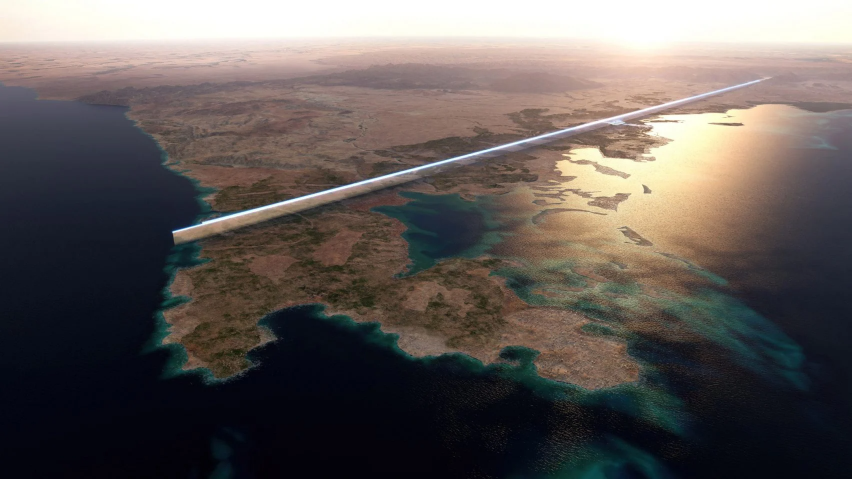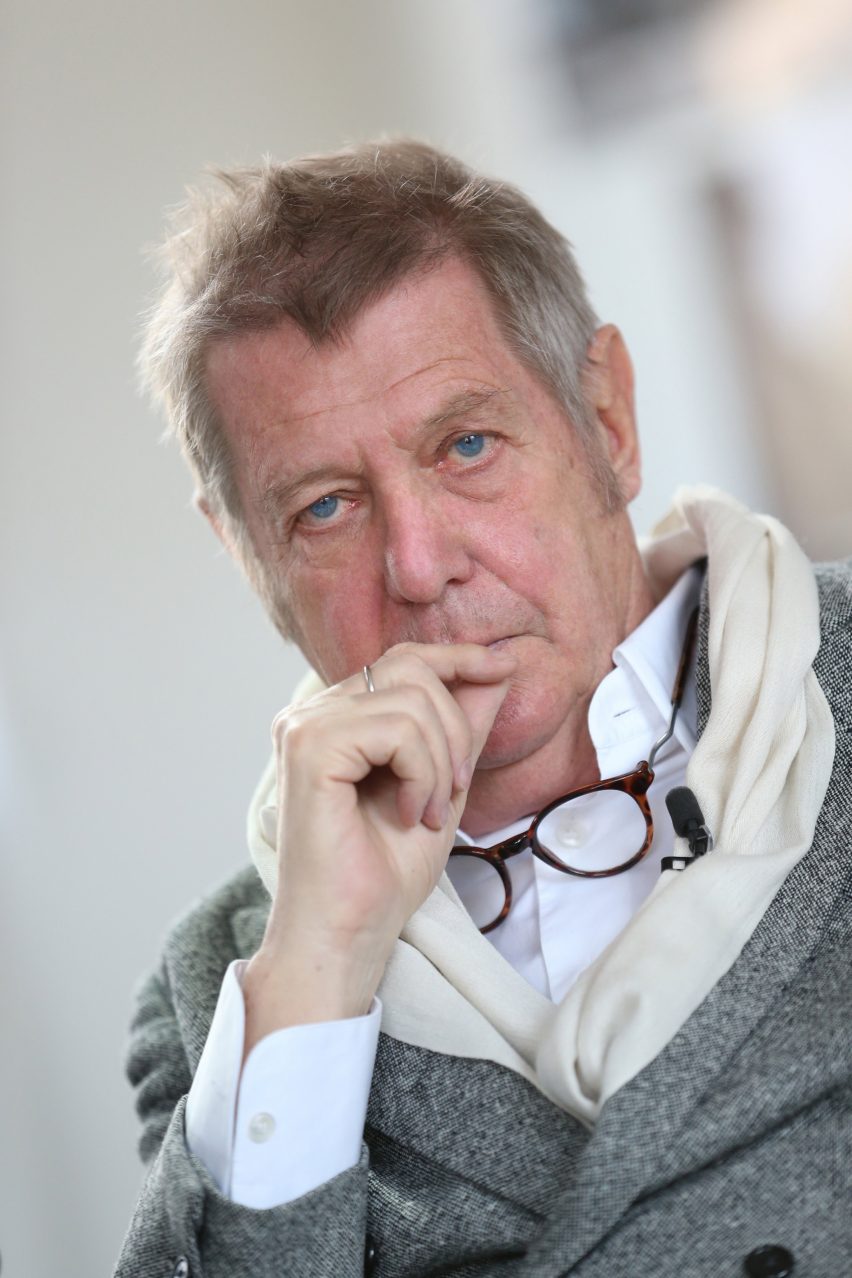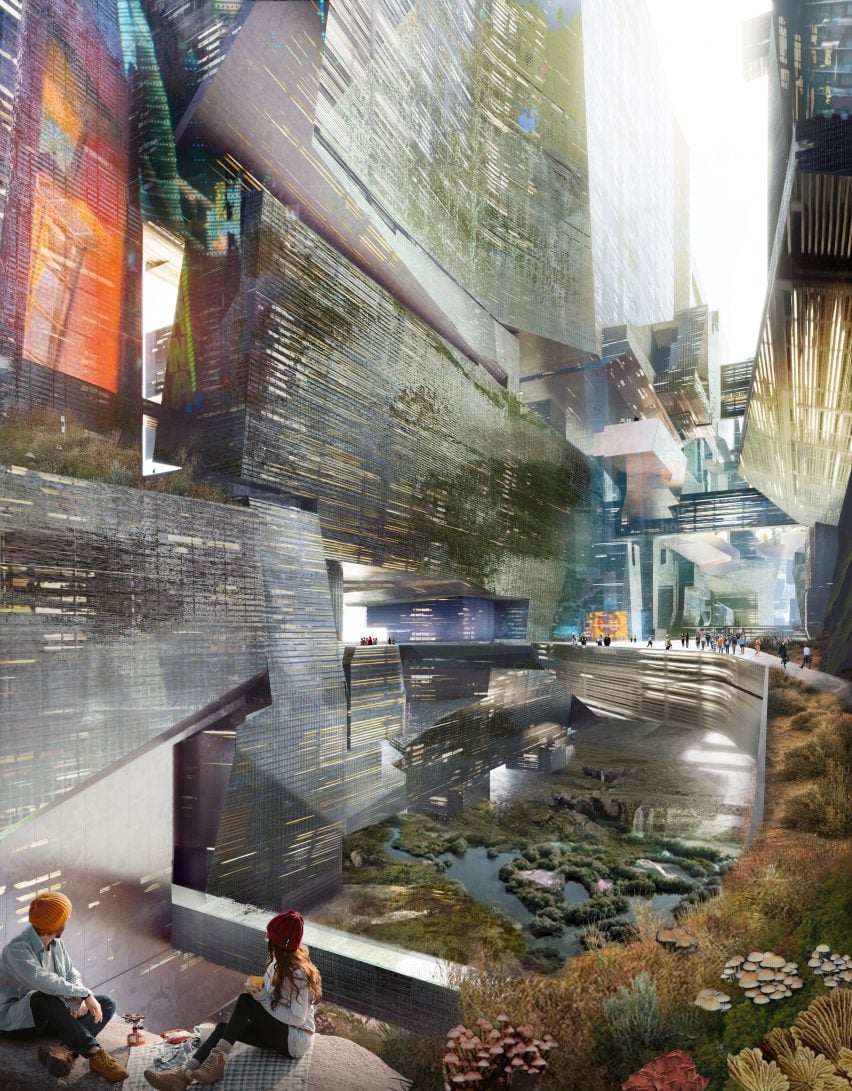
Working on The Line a "tricky argument" for studios boycotting Russia says Wolf Prix
Austrian architect Wolf Prix, who designed a section of The Line, hints at the hypocrisy of studios working on the Saudi mega-project and criticises the "main idea of the whole thing" in this exclusive interview.
Speaking to Dezeen from his office in Vienna, Prix praised the starting point of rethinking the layout of cities but questioned the linear concept of The Line, which is planned to be 170-kilometres long and only 200 metres wide.
"They have the possibilities and the money to do research and develop new materials, new structures, new mobility, but not in the way they currently pursue it," he told Dezeen.
"What I criticise is the main idea of the whole linear thing, but all the critics should see the possibilities which are behind the idea."

Prix is one of the first architects to have worked on The Line to speak publicly about it. He explained how his studio, Coop Himmelb(l)au, was one of several international practices invited to design a segment of The Line following the initial linear concept being decided on.
Coop Himmelb(l)au was named in a Riyadh exhibition as working on The Line megacity, but Prix said that the scheme had "vanished" and he has "no idea what happened" to the studio's design.
"Neom will end up as a new hotel"
Although Prix is no longer working on The Line, he is still hopeful that the linear concept of the city will be rethought.
He predicted that the project will only be realised in part, with one or two of the 800-metre-long modules completed and eventually used as a large, high-end hotel.
"I am still hoping that the major concept for The Line will be reorganised," he said. "What I am afraid of is that Neom will end up as a new hotel – maybe not the entire length, but one or two segments."
Despite these criticisms, he believes the project could act as an impetus to fundamentally rethink how cities work.
"I heard that criticism of the project is heavy," he said. "Everyone says it's impossible, it's stupid, because of climate issues, because of materials and so forth and so forth."
"But I can imagine these people are not thinking about the next step in the future – how cities have to be reorganised," he continued.
"In Europe, the city planners think about reorganising our cities with the rural method – everything should be very modest and green. I don’t know whether this method [The Line] will be successful, but this [the European way of thinking] for sure is not the point of departure for the future."
"I design what I want to build and take responsibility"
Prix also addressed the criticism directed at studios working on Neom, which has been criticised by human-rights organisations.
Coop Himmelb(l)au was one of the only international studios that chose to continue working in Russia following the country's invasion of Ukraine, and Prix suggested that some studios were being hypocritical by working on the Saudi project.
"A lot of people who said 'we will not work in Russia because of Putin', are now working in Saudi Arabia," he said. "This is a kind of tricky argument."
"I have no bad feelings. I design what I want to build and take responsibility for the building," he continued.
"I didn't build our opera house it Sevastopol for Putin, I did it for the people of Sevastopol and this is my decision."
"How will kids go to school?"
Prix said he agreed to design a segment of The Line as the project "sounded very interesting" and was a continuation of broader urbanism thinking being developed in the 1960s.
"We were very concerned with a new kind of city planning," he explained.
"So, when we got a call from Neom I was very interested because I thought we can finally develop our designs of vertical cities and complex structure of the '60s. I thought maybe we can design a city thinking more detailed about computerised traffic and connections."

Within the design for its segment of The Line, Coop Himmelb(l)au aimed to overcome some of the fundamental problems of connectivity created by the city being made of two parallel skyscrapers separated by a large void, Prix explained.
"How will kids go to school? This is very important," he said. "What I'm missing is the complexity of structures where also the kids can travel through the whole city without being in danger."
"The city as part of our life is what we are interested in," he continued.
"A city cannot exist only for one kind of people"
However, he explained that the "client doesn't want this" and he would "need more political power" to implement his ideas for The Line.
He believes that the city is being designed only for young people and will not function well due to the homogenous nature of the inhabitants.
"Neom has to think about who will live there," he said. "If you have two 500-metre-high walls with housing – I only can imagine that only young people will sit there without daylight because they are working on the computer like crazy. And in the evening, they're going down to the canyon to have parties."
"But a city is not a city only for one kind of people, we need to think of everyone old or young, middle class, poor or rich," he continued.
The Line is one of the world's largest and most controversial projects. A recent documentary outlined the current plans for the city, which is being designed to a concept created by US studio Morphosis.
While numerous studios have been connected to the city, the documentary stated that five studios are currently each designing a 800-metre module for The Line.
The project has been criticised on sustainability and liveability grounds as well as its human rights record with human rights organisation ALQST reporting that three people who were evicted from the Neom site have been sentenced to death.
Speaking to Dezeen, Amnesty International's Peter Frankental said that companies working on Neom were facing a "moral dilemma" and should "think twice" about their continuing involvement in the project.
The portrait is by Zwefo.
Dezeen In Depth
If you enjoy reading Dezeen's interviews, opinions and features, subscribe to Dezeen In Depth. Sent on the last Friday of each month, this newsletter provides a single place to read about the design and architecture stories behind the headlines.